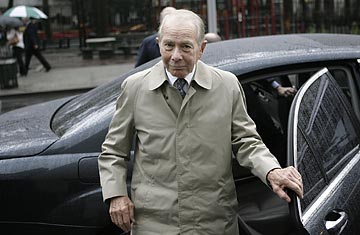
Former AIG CEO Maurice (Hank) Greenberg enters Manhattan federal court
It looks like AIG, and its taxpayer owners, can wave another $4 billion goodbye.
On July 7, a federal jury, after deliberating for less than a day, decided that Starr International, the former AIG subsidiary controlled by former AIG chief Maurice (Hank) Greenberg, did not steal billions from the insurance giant when the companies split four years ago. AIG, which was run by Greenberg as chief executive for more than three decades, had said it hoped to use the proceeds Starr had received from the sale of shares that AIG claims were its own, about $4.3 billion, to help the company repay a small portion of the $180 billion in assistance the insurer has received from Washington. Last fall, AIG had to be rescued from near collapse by the government when it became clear that the insurer would have to pay out tens of billions of dollars on guarantees it had made on mortgage bonds that went bad.
Now it appears as if AIG won't be getting that money back, though the company seems to be holding out hope. An AIG spokesman says, "We are disappointed by the jury's verdict, and we await the court's final ruling. We continue to believe in the merits of our case."
During the trial, AIG claimed that Starr was set up as a subsidiary of the company to run an executive-compensation fund for the insurer. For tax benefits, the program was set up as a trust administered and held by Starr, but AIG was the rightful owner of the shares. The insurer said Greenberg hijacked Starr and the trust when he was ousted as the company's CEO in 2005 amid an accounting scandal. Starr countered that it is a separate company from AIG and that the shares and any proceeds it was able to gain from selling the shares were always the property of Starr.
Before the trial began, in an unusual arrangement, Judge Jed Rakoff, who heard the case, ruled that a jury would decide the basics of the case, i.e., whether Starr had broken an agreement with AIG when it sold a portion of its trove of AIG shares. The judge would then issue a ruling as to which company was the rightful owner of the shares. So the judge, in theory, could still award AIG the remaining shares and the proceeds from the shares that have already been sold, even though the jury has already ruled that Starr was within its rights to sell the shares. Rakoff said he would make his final ruling by the end of August.
But the judge, like the jury, is likely to rule on the side of Starr, says Columbia law professor John Coffee. He teaches a class with Rakoff but says he has no knowledge of the judge's leanings in the case. Still, Coffee says it is unlikely for any judge in this kind of case to go against a jury. "Jury verdicts are usually given substantial weight by judges," says Coffee. "So it would be unusual for a jury to find that there was no liability and then for a judge to turn around and say that there was one."
What's more, Coffee says a jury verdict is a good indicator of which way a judge is leaning. "Often a jury goes in the direction of what a judge believes," says Coffee. "Consciously or unconsciously, a judge's opinion, whether explicitly expressed or not, of a case usually influences the jury." And there is evidence that Rakoff found AIG's case wanting. About a week into the trial, which started in mid-June, Rakoff said — with the jury out of the courtroom — that he had not been convinced by the case AIG's lead lawyer, Ted Wells, had made thus far.
Wells rested most of AIG's case on the claim that Greenberg was a liar. Wells presented numerous documents and speeches made by Greenberg in which the former AIG executive said over the years that Starr was set up for the benefit of AIG's current and future management. Wells said Greenberg's claim during the trial that Starr was a separate company went against his earlier statements. Still, whether Greenberg was lying or not didn't seem to matter. Coffee says legally, Starr has a strong argument that while it had a practice of using its shares to compensate AIG executives, it had no legal obligation to continue to do so.
A Starr spokeswoman says, "We are gratified by the jury's quick and complete vindication of Starr International and Mr. Greenberg, and the jurors' quick and complete rejection of the outrageous personal attacks on Mr. Greenberg's character by AIG and its counsel."
The irony of the case is that for Greenberg, who says he was upset when he lost his job as CEO of AIG, it now appears getting tossed from the insurer may end up being another brilliant career move for the 84-year-old executive. Greenberg was never found guilty of any impropriety during his time at AIG. And since he has left, Greenberg, using the billions he generated from selling Starr's stake in AIG, has built Starr into a real insurance company. What's more, Starr is growing at a time when AIG, still trying to figure out how to repay the government, is likely to continue to shrink or disappear altogether.
